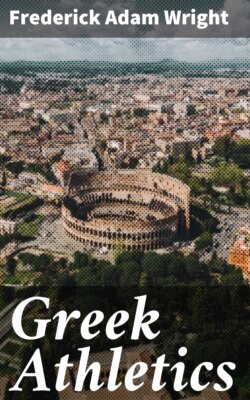Greek Athletics

Реклама. ООО «ЛитРес», ИНН: 7719571260.
Оглавление
Frederick Adam Wright. Greek Athletics
Greek Athletics
Table of Contents
PREFACE
1. Athletics and Athletic Festivals
2. Gymnastics and Military Training
3. Physical Education
4. Health and Bodily Exercise
5. Galen’s Treatise on the Small Ball
SELECT BIBLIOGRAPHY
Отрывок из книги
Frederick Adam Wright
Published by Good Press, 2021
.....
‘Who by skill in wrestling, or by lifting the diskos, or by a shrewd blow on the jaw ever helped his native land, even though he won the prize? Will men fight the foe holding a diskos in both hands, or will they get home with one fist through the foemen’s shield? No one thinks of such folly when he is standing near cold steel.’
These last lines, though written by an Athenian poet, represent the Spartan reasons for withdrawal from Olympia. In the early days of the festival—from 720 to 576 b.c.—the number of Spartan victors in the list is very large, and shows, indeed, an undisputed Spartan supremacy. After 576 they cease almost entirely, and the disappearance of Sparta coincides with the specialization of athletics which then began. At Delphi, Corinth, and Nemea small local games were changed into national festivals which hoped to rival Olympia. Besides the four great festivals, there were countless smaller competitions established—at Athens, for example, at Argos and at Pellene, and the first result was a distinct rise in the standard of athletic performances, so that definite training became necessary to win success. Secondly, people began to attend the meetings purely as spectators, and additional competitions—in music, poetry, even in beauty—were introduced to please an idle audience, with the result that at last these gatherings presented almost as many attractions as a mediæval fair. It was against this combination of international merrymaking and individual prize-winning that the Spartan system was a protest. ‘Sparta for the Spartans’ was the ruling principle of the Spartan State, and aliens who tried to establish themselves at Lacedæmon were removed by somewhat drastic methods. In a State where all personal initiative was discouraged, the international athlete, honoured by poets and sculptors for his mere personal prowess, could have no place. Moreover, athletics, which the Spartans were prepared to support as a useful recreation tending to produce that which alone in their judgment was of importance to a State, good soldiers, had in the sixth century before Christ become an end in themselves, and the gulf between the specialized athlete and the soldier very quickly began to widen. The athlete soon became a professional in fact if not in name, with little time for anything else but training. A class of professional instructors came into existence, and Sparta, after first excluding the trainers, finally forbade her citizens to take part in such competitions. She saw that the spirit of the professional athlete was at enmity with the military ardour which she made it her business to create, and so after about the middle of the sixth century she practically withdrew from active participation in the Olympic festival.
.....